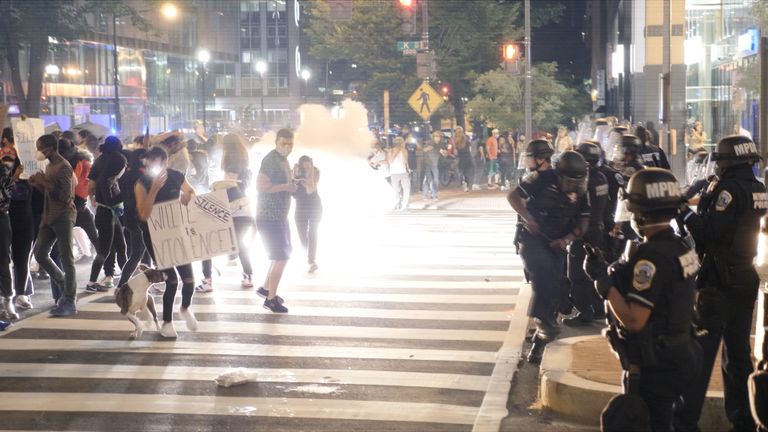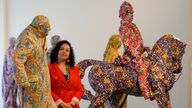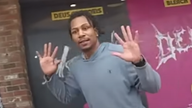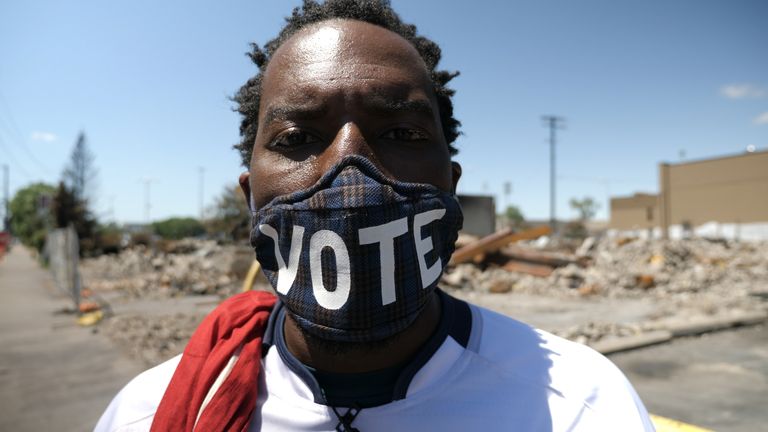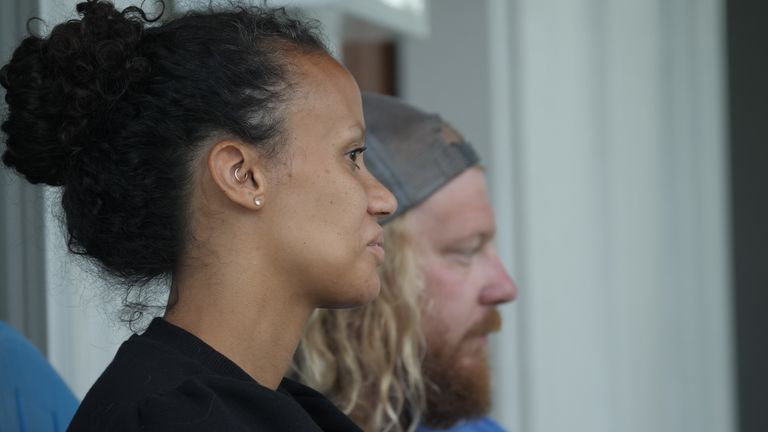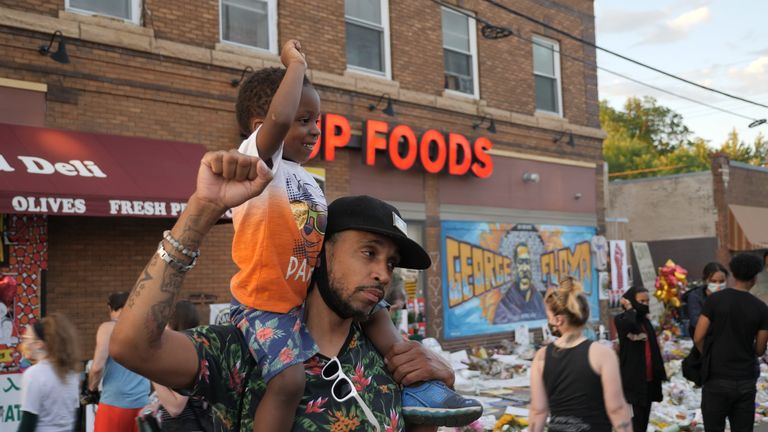George Floyd death: The people of America are saying they've had enough - this time it feels different
Little radical change in the US is achieved without radical action and this time the nation seems ready to listen.
Friday 12 June 2020 23:41, UK
I've seen so many protests flare and fade in America.
I've watched and witnessed the outrage, incredulity and calls for change. In Cleveland, I interviewed the family of Tamir Rice, a 12-year-old boy shot and killed by police in 2014 for playing with a toy gun.
In Baton Rouge, I met the friends of Alton Sterling, incensed and distraught as they took to the streets in exasperated anger. The 37-year-old was shot and killed by police at close range.
In Baltimore, I spent time in Freddie Gray's neighbourhood, a place where even months after he died in police custody, they were being trailed by helicopters.
Trayvon Martin, Michael Brown, Eric Garner, Philando Castile, Breonna Taylor, Walter Scott. They are all probably names you also know and that I've reported on.
There are also names we never get to hear, whose cases never got the public attention they deserved.
But after George Floyd's death, something felt different.
His name, his story, seem to have sparked something truly global. I wanted to know if people in Minneapolis shared that view and, if so, why? Was this a tipping point - America's racial reckoning finally realised after hundreds of years of disregard for black people's lives, rooted in slavery?
Everyone I spoke to - campaigners, lawyers, activists and those strangers who just turned up to pay their respects to George Floyd - said the graphic video of his death had a profound effect on them, on the strength of reaction and the speed of prosecutions.
:: Listen to Divided States on Apple podcasts, Google Podcasts, Spotify, and Spreaker
Mel Reeves, a veteran civil rights activist, said: "What you're seeing is, you're seeing a human response. This is humanity saying we've had enough. Not just black folks, but white people who are saying we've had enough."
At the site where George Floyd was killed, so many people said they also saw their own sons and daughters when they heard him call out for his mother as he struggled.
The response, not just in Minneapolis, not just in the big cities and not just in America, was rapid and intense. People took the time to watch the video and everyone I spoke to was appalled - whether it was in the white suburbs, or the epicentre of the story. It appeared to give new momentum to a movement that started long ago.
Black Lives Matter began in 2013. And yet it's taken until 2020 to see a truly broad coalition of people get behind it. Suddenly it looked like white people were comfortable saying it - and no, it wasn't just the liberals or the far-left US President Donald Trump likes to talk about.
America and the world were waking up to what black people have always known and lived. It was as if that video was the evidence some people needed to really understand.
Michael, a new generation of campaigner, uncompromising and dynamic - who has been a constant presence at the memorial site, rallying the crowd from a makeshift stage - told me this is the first time he's felt free.
"I feel like we finally got some air. I feel like a cage around my body was just taken off... I feel like now white people were taking the other white people's hands off of my hand. All those fingers that were there for 400 years are now gone. And now I can breathe."
As we stood among the rubble of the stores burned down during the protests, he made clear he didn't support the destruction, but believed it had sent a powerful message that made people listen.
"I don't condone destruction but, if it's what we had to do to get our message heard, if this is what we have to do to get the thought process at least open… okay… we were left with no other options."
The reality is much of the damage was done by outsiders, many white not black. But American history shows you little radical change is achieved without radical action, and the flames and fury captured a nation that this time seemed ready to listen.
What really struck me about being in Minneapolis was the sense of collective trauma and to some degree catharsis that followed it. People kept telling me they felt compelled to speak up in a way they've struggled to before - to raise the micro-aggression and the macro-violence and prejudice they have faced.
Just a few hundred metres from the spot where George Floyd begged for his own life, we met Andy and Leslie. They were kind enough to let us use their toilets. We were two strangers knocking on their door in these weird COVID times and they could not have been more welcoming - offering us water just like they had to every stranger who'd walked by in mourning and protest.
Leslie is black, Andy white, and they'd both been processing a lot of emotions as they saw their area on fire and changing the course of a country.
Leslie, an articulate, thoughtful woman and the daughter of a lawyer, told me she had experienced the judgement of police and the prejudice of teachers since she was a child.
In the past few days, she decided to share her experiences with colleagues by writing an email to them. She recalled how a teacher had told her: "You're the reason why I don't like rich minorities" and that she was going to "knock me down a peg or two and the world would, too".
She described how she had often felt constrained because "you fear saying anything because you don't want to be the angry black woman", but she is adamant she "won't be quiet anymore". It was incredibly powerful, sobering, and distressing to hear.
Her partner Andy, who works in a predominately white office, said he hoped at the very least this tragedy would take everyone closer to checking their "white privilege". It's a phrase some might suggest is the reserve of liberals in Democratic cities. But that's not what I saw in the white suburbs in Minneapolis. And honestly, I was surprised.
America is a country made up of small towns. Policing and perspective is a very local thing and fear of "the other" runs deep. In Prior Lake, where people were out enjoying ice cream and cruising on speedboats, George Floyd's death was still resonating.
Everyone we spoke to was horrified by the video and some people told us that had prompted them to have conversations with neighbours they'd never had before.
There were still people like John, who refutes the very idea of white privilege, who doesn't think black people are disadvantaged in America. The statistics don't bear that out - in health, in education, in policing. And if you were in any doubt, coronavirus should be a clear reminder of how African-Americans are at the sharp end of so many crises here.
In just four years in the US, I've seen two massive cultural moments unfold - the Me Too movement and Black Lives Matter. The former brought down institutions, prosecuted perpetrators, changed workplaces and Hollywood. The embedded nature of racism means the hill towards change will be harder to climb.
America can't atone for its racist sins until this debate permeates every corner of it, every small town. This feels like the start and the people are leading it. The politicians are either playing catch-up or still unwilling to engage with the problem.
In just two weeks, 11 cities have banned police from using the controversial chokehold method to detain suspects. Minneapolis City Council voted to disband the police force. Nationally, Democrats have proposed sweeping legislation. Justice will likely be slow. But public pressure may be here to stay. There has been some concrete progress even in the middle of a pandemic.
Race and Revolution: Is Change Going to Come?
Sky News will broadcast a global debate show on Tuesday night at 8pm - looking at the issues raised by the Black Lives Matter protests, and examining institutional racism and how we fix it.
If you would like to be part of our virtual audience, and have a chance of putting a question to our panel, please send your name, location and question to newsdebates@sky.uk

